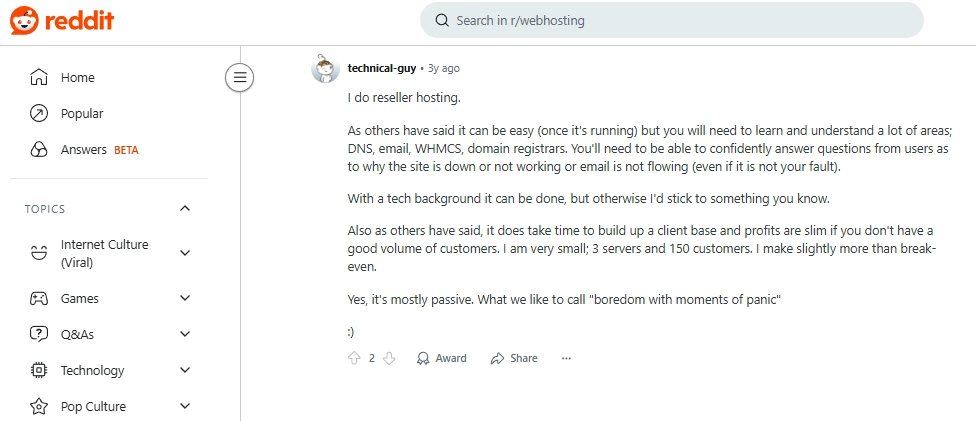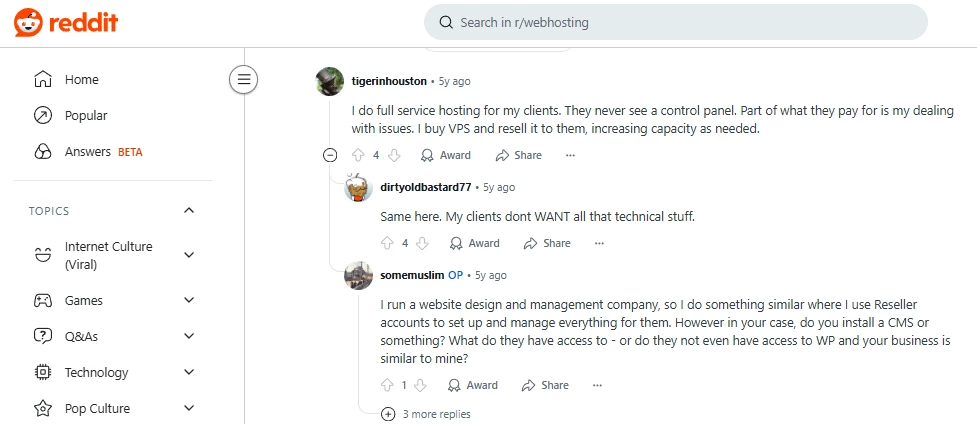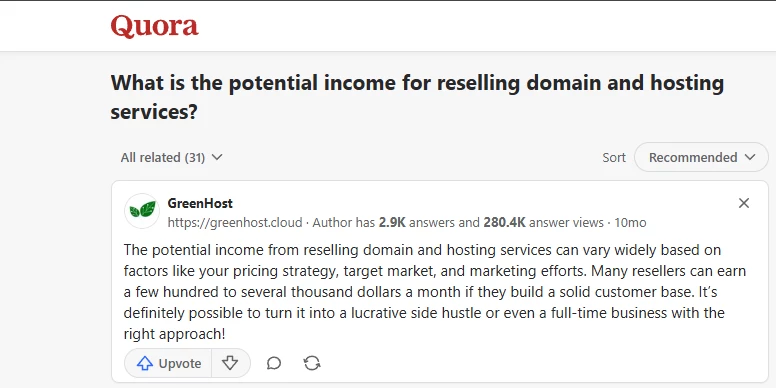This guide is part of our series on selling web hosting services. Here, we’ll walk through the main business models available. Our focus will be on how to resell hosting, as it’s the path most beginners take. It’s low-cost, doesn’t require you to own or manage servers, and it’s an especially good fit for web designers and digital agencies who want to sell hosting as a side income. Once you’re confident, you can start selling web hosting as a full-scale company.
What Is Reseller Hosting?
Now, how does reseller hosting work? You buy a set of hosting resources from a larger provider (disk space, bandwidth, email accounts, etc.) and then repackage those resources into your hosting plans. You sell them under your brand to your clients.
It’s essentially a step beyond affiliate marketing. Affiliates send traffic to a hosting company and get a cut. A hosting reseller, on the other hand, owns the business.
When researching how to resell hosting, you’ll often read that reselling hosting services is “easy” because the provider takes care of everything. That’s not 100% true. The provider keeps the servers online and handles things like security updates. But once you start offering hosting for sale, your clients deal only with you. If their site goes down, if they don’t understand their control panel, if they need billing support — they come to you, not the provider.
So, who does what?
- You (your hosting reseller business): manage accounts, billing, and all client communication.
- Hosting provider: maintains servers, installs security updates, and runs the core infrastructure.
That’s the basic model of how reseller hosting works. It gives you a way to run a hosting reseller business without running a data center.
How to Start a Reseller Hosting Business: 3 Key Steps
We’ve seen how reseller hosting works; now, let’s look at how to become a hosting reseller.
How to Resell Hosting Step 1: Plan your reseller hosting business
The first step in becoming a hosting reseller is planning. Before you sign up with any provider, ask yourself three questions:
- Who will I sell to?
- How will I bill my clients?
- How will I market my reseller hosting services?
Who will I resell hosting to?
As with any other business, to start reselling hosting, define your target clients:
- existing web design or development clients;
- small agencies or freelancers who need hosting for multiple projects;
- niche audiences like bloggers, e-commerce shops, or local businesses.
Once you know who you’re selling to, the “what” naturally follows: the hosting plans, limits, and add-ons.
If you’re a web developer or agency, chances are you already have clients. That’s a huge advantage: you know what kinds of projects they run, how much traffic they get, and what kind of limits would fit them. Use that knowledge to sketch out hosting plans that feel natural for your clients’ needs.
For example, a simple business site might be fine with 10 GB of SSD space and one domain. An e-commerce store probably needs more bandwidth, daily backups, and room to scale. Build your entry, mid, and pro plans around these concrete scenarios.
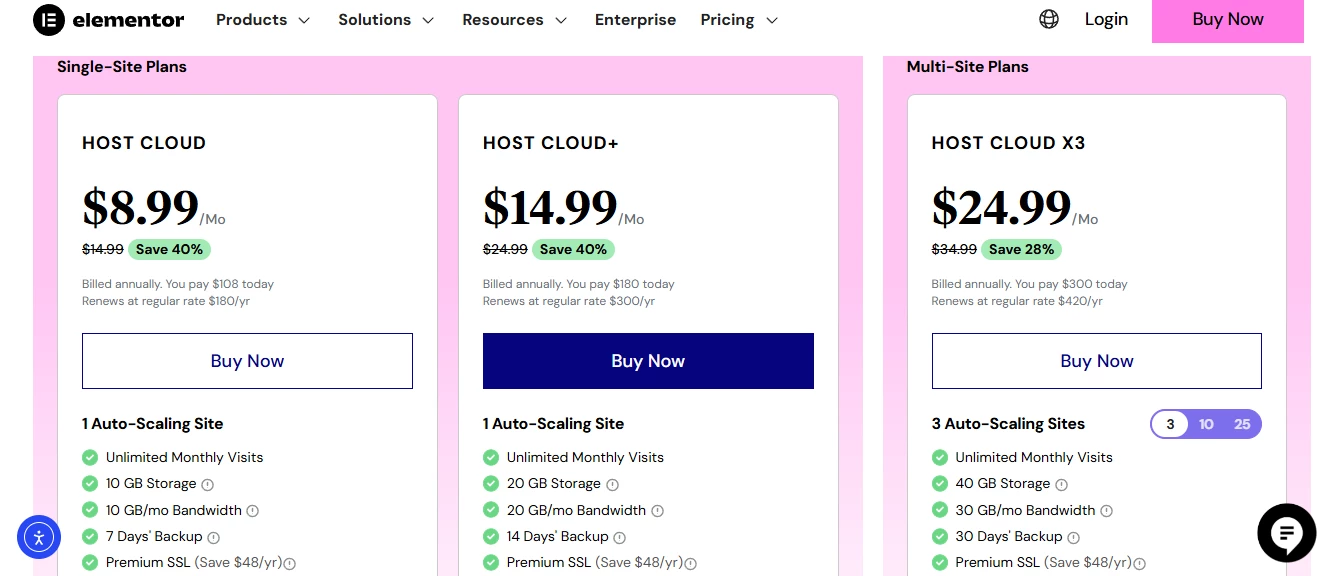
For example, your plans have the following structure (a very simplified version to illustrate the point):
- Starter — 10 GB SSD, 1 site, $4.99/month;
- Growth — 50 GB SSD, 10 sites, daily backups, $12.99/month;
- Pro — 150 GB SSD, 50 sites, WHMCS license, $29.99/month.
Let’s say five of your existing clients take the Growth plan at $12.99/month. That’s $65/month right away. This figure helps you assess reseller plans from providers. You can calculate:
- How many client plans can you fit into the resources you buy?
- How many plans do you need to sell to cover your costs?
Doing this math lets you understand whether a hosting provider offers good reseller terms or not.
How will I bill clients?
Next, there’s billing. Will you send invoices manually or use automation? Manual billing may only be fine for a handful of clients. Though technically feasible, this approach is neither reliable nor scalable. The safest option is tools like WHMCS, Blesta, or HostBill. They connect your plans with payments, domains, taxes, and reminders.
How will I market my reseller hosting services?
Finally, how will people hear about you? Many resellers start by offering hosting as an add-on to their web design work. That’s convenient since you already know those clients and their needs. But if you aim wider, your marketing must be sharper.
Check our comprehensive guide on how to get clients for a web hosting business with plenty of examples.
Good planning means it will be easier for you to evaluate reseller plans from different hosting providers.
How to Resell Hosting Step 2: Buy your reseller hosting plan
The next step in planning how to resell hosting is to pick a reseller hosting package. To do that, you need to learn to read reseller hosting packages. Let’s take Ultahost as an example.
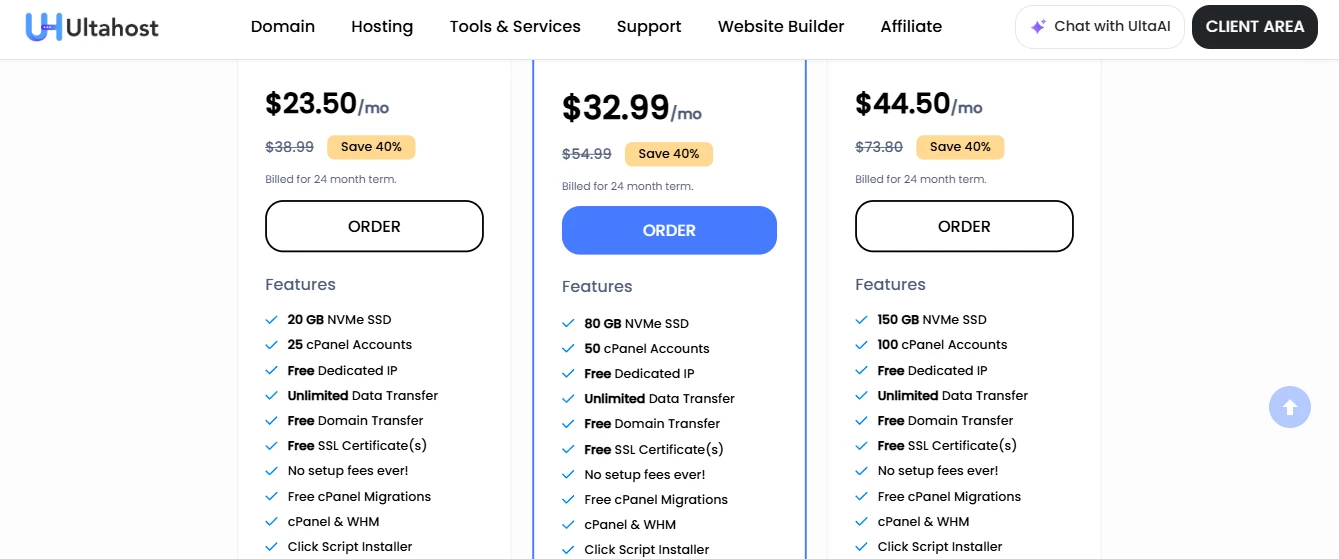
So what is what here? First off, there’s always disk space. For example, in the basic Ultahost plan, it’s 20 GB NVMe SSD, so this is the total storage you get for all your clients. Imagine you host 10 small business websites (mainly informational ones), which is an average of 0.8 GB per account if fully populated. In practice, most small clients won’t hit that limit right away. Some may use only 200–500 MB at first. So the disk space figure lets you see how many clients you can realistically host.
Then, the number of control panel accounts (in most cases, hosting providers bind their reseller plans with cPanel) means the number of clients. In other words, the disk space may allow 15–20 clients, but the number of control panel accounts might be capped at 10. At first, 10-20 clients should be more than enough.
When it comes to “unlimited data transfer,” in theory, this means clients can handle lots of traffic without worrying about hitting a bandwidth limit. In practice, “unlimited” usually comes with fair-use policies. Small sites won’t face issues, but very heavy sites may require an upgrade.
Overall, the key idea is simple: try not to overpay at the start. Keep this principle in mind when choosing both the size of your plan and the way you’ll pay for it (monthly or annual billing). Annual payments look cheaper, but if this is your first reseller plan, monthly payments are safer. This way, you can test the provider and switch if needed, without losing a year’s worth of fees.
The last setup step is about domains and branding. You’ll either register a new domain for your reseller hosting business or transfer an existing one. To make your service look professional and independent, you may want to buy private name servers. This way, your clients won’t see the upstream provider’s name anywhere.
Sometimes, providers also let you choose your server location. The classic advice is to pick the spot closest to where most of your clients are based because websites will load faster (not a 100% guarantee, but still).
How to Resell Hosting Step 3: Set up your hosting packages
Once you’ve bought your reseller hosting plan, you turn those raw resources into the hosting packages you’ll sell. This happens inside the control panel. Most hosting providers bundle their reseller plans with cPanel, so you’ll be working with it and WHM.
Later on, if you scale beyond simple reseller hosting and run your own VPS or dedicated servers, you can choose any control panel to power your infrastructure. The panel you choose will have a direct impact on both your costs and revenue. You could go with industry leaders like cPanel or Plesk (we’ve compared them in detail before). Or you might choose a more modern, affordable option like ispmanager.
Getting back to creating packages, the process is similar in most control panels, though the buttons may look different. What you’re really doing here is drawing the lines. Each package is just a set of limits, for example:
- Disk space (how much storage they get);
- Bandwidth (how much traffic their site can handle each month);
- Number of databases and database users;
- FTP users (who can upload files);
- Number of websites or addon domains;
- Email domains, mailboxes, and email send limits.
The entire process is like slicing up a pie: for example, your plan gives you 20 GB of disk space and 25 accounts, so you need to decide how much each slice gets. Maybe your starter plan is 1 GB with one email account, while your pro plan is 5 GB with multiple domains and unlimited email accounts.
This is where you circle back to your Step 1 planning. If you know your clients are mostly small businesses with one site each, don’t bother offering “unlimited” everything. Design packages that match what those businesses actually need.
Once you’ve set this up, you’ve got real products ready to list on your site. Clients will see a clean menu — Starter, Growth, Pro — while you’ll track how many packages are sold, who’s using which resources, and where you’ve got room left inside your control panel.
Reseller Hosting vs Other Web Hosting Models
So far, we've been focusing on how to resell hosting. But reseller hosting isn’t the only way to run a hosting business. It’s just the easiest way to start, and that’s why many people choose it. Like we said above, if you’re a web developer with existing clients, it’s almost a no-brainer to host their projects too. But if you’ve got more resources, technical expertise, or bigger ambitions, there are two other models for selling web hosting services.
| Model | Difficulty | Who manages servers? | Startup costs | Best for |
| Reseller hosting | ⭐ | provider | $45–$100 | beginners, web developers |
| Renting servers | ⭐⭐ | you | $100–$500 | ambitious starters, niche hosting experiments |
| Buying servers | ⭐⭐⭐ | you | $3,000–$5,000 | advanced entrepreneurs, building a full-scale hosting company |
If curious how to set up the chosen path to selling web hosting, check our full guide on how to start a web hosting business.
Resell hosting (⭐)
This is the classic entry point. You buy hosting resources from a larger provider and sell them under your brand. You set the prices, design the packages, and support your clients, while the provider takes care of the hardware, uptime, and data center operations.
We've discussed how to resell hosting in detail above, here's just a quick summary of the key advantages:
- you don’t need to buy licenses (beyond what the provider bundles in);
- you don’t have to be a server admin;
- you can launch quickly.
Many experienced hosts recommend starting this way because it lets you learn how web hosting really works without risking a lot of capital. You’ll also pick up the best practices directly from your upstream provider: how they handle support, how their control panel works, what issues crop up, and how to solve them.
Rent servers to sell hosting (⭐⭐)
The next step up is renting infrastructure — dedicated servers, VPS, VDS, etc. — and running them as your hosting environment. You’re still leasing machines, but now you’re responsible for configuring the stack, keeping the servers secure, and maintaining uptime.
This gives you more flexibility than simple reseller hosting. You can install whatever control panel you like, experiment with niche services (say, hosting optimized for Node.js apps), and create a product that feels more tailored. The trade-off is that you’re now in charge of server management: updates, patches, monitoring, and troubleshooting.
Buy servers to sell hosting (⭐⭐⭐)
Finally, the most advanced path to selling hosting services: buying and running your physical servers. Here, you control everything, from the data center space and power supply to the software stack and IP addresses.
At a minimum, you’ll need to plan for:
- Placement: Your servers need a secure colocation facility with 24/7 access, cooling, and redundant power.
- Connectivity: One high-speed uplink is the minimum, but in practice, you’ll want two or more from different providers for failover.
- IP space: Many clients ask for dedicated IPv4 addresses.
- Redundancy: Decide on your service level. 99.9% uptime (about 9 hours of downtime per year) is a realistic starting point.
A minimal production-ready setup usually includes one to two web servers, one mail server, replicated database servers, at least two DNS servers for redundancy, and often a separate backup server.
The software stack is up to you. You can run LAMP, LEMP, or something niche.
This path is capital-intensive and technically demanding, but the payoff is full control. You’re no longer reselling hosting — you are the provider. At this point, you can even create your reseller program.
How Much Does It Cost to Start Reselling Hosting Services?
By this point, you’ve got a plan for how to resell hosting. Now, there are costs to consider. Let’s break it down using a practical example: say we pick Verpex’s Pro Reseller Plan at $20/month.
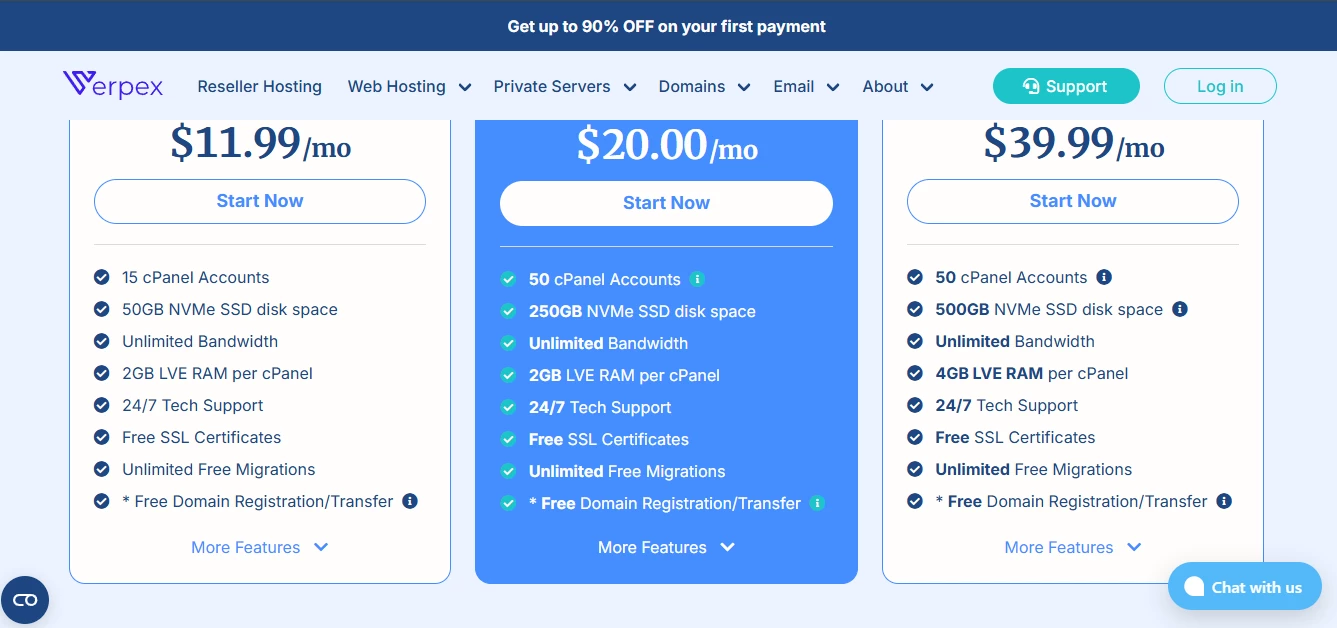
The plan gives you 50 cPanel accounts, 250 GB NVMe SSD, unlimited bandwidth, and so on. This is your starting point: the “raw resources” you’ll split into packages like Starter, Growth, and Pro. But your expenses don’t end here.
Domain and branding costs
You’ll want a domain name for your hosting brand, plus private nameservers so your clients don’t see the upstream provider. A polished website theme or template can also help your service appear credible. This leaves us with:
- ~$10–15/year for a domain name;
- ~$5–10/year for private nameservers;
- ~$30–60 (one-time) for the website theme/template.
Total costs: ~$45–85
Billing and automation
Automation is super helpful for any business that resells web hosting. Tools like
- WHMCS (~$24/month),
- Blesta (~$12/month),
- and HostBill (~$600 for lifetime license)
connect your plans to payments, domain registration, taxes, and reminders. They save hours of manual work and let you avoid many unpleasant mistakes.
Marketing and client acquisition
You can start by hosting your existing web design clients. And when you want to reach out to new customers, marketing will help you do that. Budgeting to consider in this regard:
- Ads (Google, Meta) — $50–200/month for testing;
- Email campaigns/CRM tools — $10–50/month;
- Optional content creation or design support.
All in all, an estimated total could be about $100/month for a small reseller setup with 10–20 active clients. It may be helpful to calculate costs per client. That is, if your Starter plan is $5/month, you’ll need 20 paying clients just to cover $100/month. This helps set targets for breakeven and profit margins.
3 Ideas to Earn More as a Hosting Reseller
Now that you know the basics of how to resell hosting, your hosting plans will be responsible for bringing in steady income. In the meantime, you can also earn a bit more from extras.
SSL certificates
Almost every site needs HTTPS, as this is what Google, browsers, and clients expect. So SSLs are a good upsell.
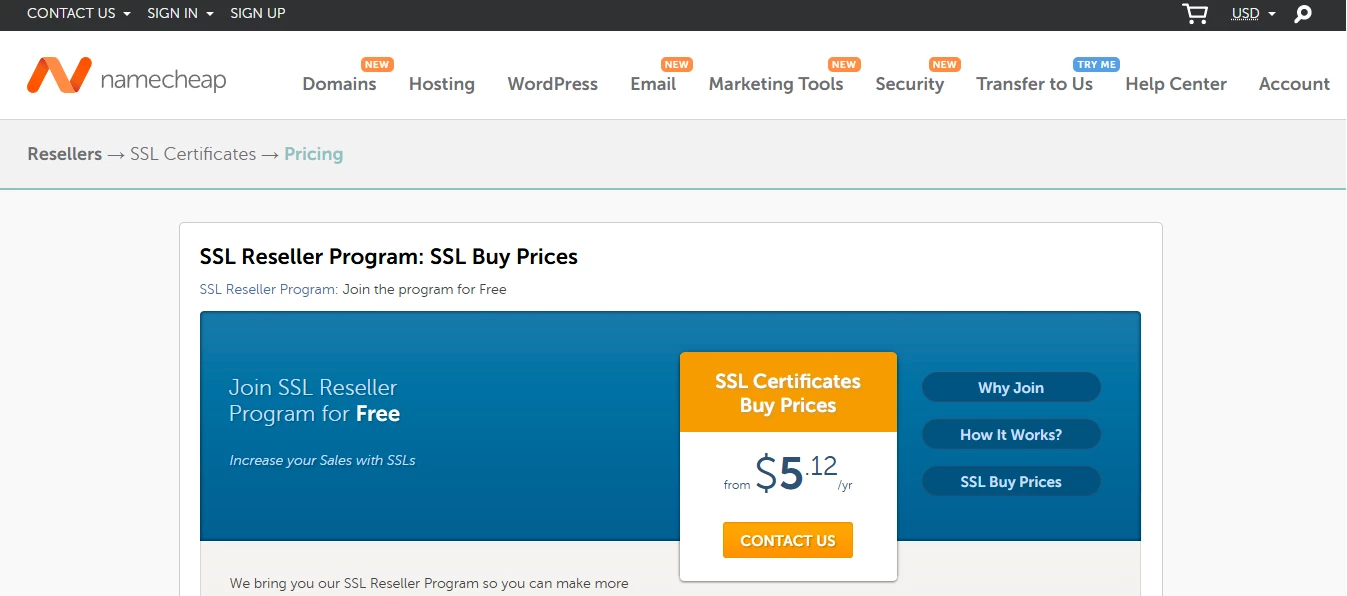
Big hosting providers typically include free SSL certificates in their reseller hosting plans. If your plan doesn’t have that, you may look for an SSL reseller program. You may also offer different certificate types, such as DV (domain-validated) for simple sites, OV or EV for businesses or e-commerce, and so on.
Imagine you get a DV SSL certificate for $6 wholesale. You resell it at $35. That’s roughly $29 profit per certificate. If 20 of your clients buy SSLs in a month, that’s $580 extra revenue.
Security add-ons
Security is more than SSL. Clients care about malware, spam, backups, and firewalls. You can offer extras to address those needs:
- Malware scanning / patching service: every week or daily;
- Web application firewall (WAF);
- Security-focused backups.
One security add-on could bring you about $200 monthly if you close the right gap with it.
Email services
Web hosting plans usually come with email, but clients may want better email services, such as more storage or advanced spam filtering. And that’s where you can earn, too, by offering:
- free basic email with low limits, then paid tiers: more storage, more users, better security;
- “premium email” with better spam/virus protection, priority support;
- email backup, or backup of email to external storage.
For example, you include a basic email account with hosting for free. Then you sell “Pro Email Suite” for $3/user/month: 10 GB storage, spam filter, webmail, and mobile sync. If you have 20 clients, each with 2 email users, that’s 40 email accounts. If half upgrade, that’s $60 per month in extra revenue.
How to Resell Hosting: Reddit Wisdom
So far, we’ve walked you through the big picture of how to resell hosting. The next step is to look at advice from people who are already doing it. Forums like Reddit, WebHostingTalk, and Quora are all useful. We’ve picked out a few posts to give you an idea of the kind of wisdom you find there. As always, we recommend taking your time to explore it more deeply.
If you have a specific question and don’t see the answer, ask it yourself. You’ll often get more practical answers than in generic reseller hosting tutorials.
Another tip is to check out YouTube content from resellers. This is particularly helpful for learning how to create packages, connect WHMCS, or navigate a control panel.
How to Resell Hosting: Wrap Up
All in all, starting a reseller hosting business is relatively easy. Reseller plans can be very cheap, and you don’t need to be a sysadmin to get going. Of course, you can’t jump in with no knowledge at all (you’ll be handling support and client questions yourself), yet reseller hosting is still a much friendlier starting point than building a hosting business from scratch.
This guide gives you a roadmap to get started with reselling hosting services. As always, our advice is to start small and learn how everything works before you scale.
